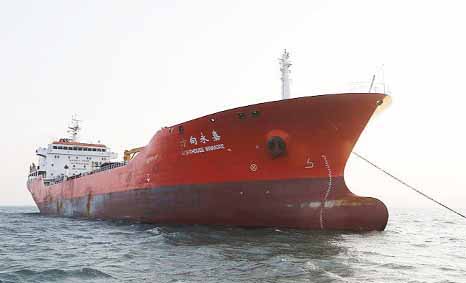
Russian tankers have supplied fuel to North Korea on at least three occasions in recent months by transferring cargoes at sea, according to two senior Western European security sources, providing an economic lifeline to the secretive communist state.
The sales of oil or oil products from Russia, the world’s second biggest oil exporter and a veto-wielding member of the United Nations Security Council, breach U.N. sanctions, the security sources said.
The transfers in October and November indicate that smuggling from Russia to North Korea has evolved to loading cargoes at sea since Reuters reported in September that North Korean ships were sailing directly from Russia to their homeland.
“Russian vessels have made ship-to-ship transfers of petrochemicals to North Korean vessels on several occasions this year in breach of sanctions,” said the first security source. A second source, who independently confirmed the existence of the Russian ship-to-ship fuel trade with North Korea, said there was no evidence of Russian state involvement in the latest transfers.
“There is no evidence that this is backed by the Russian state but these Russian vessels are giving a lifeline to the North Koreans,” the second European security source said.
The two security sources cited naval intelligence and satellite imagery of the vessels operating out of Russian Far Eastern ports on the Pacific but declined to disclose further details, saying it was classified.
Russia’s Foreign Ministry and the Russian Customs Service both declined to comment when asked on Wednesday if Russian ships had supplied fuel to North Korean vessels. The owner of one ship accused of smuggling oil to North Korea denied any such activity.
The U.S. State Department, in a statement, called on Russia and other U.N. members to “strictly implement” sanctions on North Korea and to work “more closely together to shut down U.N.-prohibited activities, including ship-to-ship transfers of refined petroleum and the transport of coal from North Korea.”
The latest report came as China, responding on Friday to criticism from U.S. President Donald Trump, denied it had illicitly shipped oil products to North Korea.
South Korea’s Chosun Ilbo newspaper earlier in the week quoted government sources as saying that U.S. spy satellites had detected Chinese ships transferring oil to North Korean vessels about 30 times since October.
U.S. officials have not confirmed details of this report, but a U.S. State Department official said Washington had evidence that vessels from several countries, including China, had engaged in transhipping oil products and coal.
South Korea said on Friday that in late November it seized a Hong Kong-flagged ship, the Lighthouse Winmore, suspected of transferring oil to North Korea. The ship’s registered manager, Lighthouse Ship Management, is in the Chinese port of Guangzhou.
A South Korean Foreign Ministry official said the ship transferred as much as 600 tons to the North Korea-flagged Sam Jong 2 on Oct. 19 in international waters between China and the Korean Peninsula, on the order of its Taiwan-based charterer, Billions Bunker Group Corp.
Taiwan’s presidential office said the firm was not incorporated in Taiwan and China’s Foreign Ministry spokeswoman said she did not have any information about the matter.
North Korea relies on imported fuel to keep its struggling economy functioning. It also requires oil for its intercontinental ballistic missile and nuclear program, which the United States says threatens the peace in Asia.
“The vessels are smuggling Russian fuel from Russian Far Eastern ports to North Korea,” said the first security source.
Reuters was unable to independently verify that the vessels had transferred fuel to North Korean vessels, whether the Russian state knew about the sales or how many Russian vessels were involved in the transfers. It was also unclear how much fuel may have been smuggled.
Ship satellite positioning data consulted by Reuters shows unusual movements by some of the Russian vessels named by the security sources including switching off the transponders that give a precise location.
The security sources said the Russian-flagged tanker Vityaz was one vessel that had transferred fuel to North Korean vessels.
The Vityaz left the port of Slavyanka near Vladivostok in Russia on Oct. 15 with 1,600 tons of oil, according to Russian port control documents.
Documents submitted by the vessel’s agent to the Russian State Port Control authority showed its destination as a fishing fleet in the Sea of Japan. Shipping data showed the vessel switched off its transponder for a few days as it sailed into open waters.
According to the European security sources, the Vityaz conducted a ship-to-ship transfer with the North Korean Flagged Sam Ma 2 tanker in open seas during October.
Reuters could not independently verify the transfer because ship tracking data showed that the Sam Ma 2 had turned off its transponder from the start of August.
The owner of the Russian vessel denied any contact with North Korean vessels but also said it was unaware that the vessel was fueling fishing boats.
Yaroslav Guk, deputy director of the tanker’s owner, Vladivostok-based Alisa Ltd, said the vessel had no contacts with North Korean vessels. “Absolutely no, this is very dangerous,” Guk said by telephone. “It would be complete madness.”
When contacted a second time, Guk said that the vessel did not have any contacts with North Korean ships and that he would not answer further questions.

